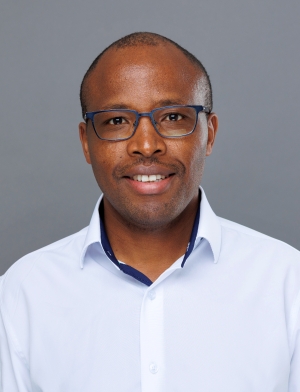
Reducing HIV-related Stigma in School Children in Northern Uganda
Interdisciplinary team receives grant for HIV-related research on vulnerable youth
‘Reducing HIV-related stigma in school children in northern Uganda’ is the name of the research project on which Dr. Maina is a co-principal investigator. The team, led by Dr. Bonnie Fournier from Thompson Rivers University in British Columbia, also includes partners from Alberta, Saskatchewan, Ontario, United States and Uganda. They represent the fields of nursing, epidemiology, social work, art and education.

Dr. Geoffrey Maina underlines the statistics that drive him and a multidisciplinary team of researchers to do their work.
“Around the world, 2.6 million kids up to the age of 15, the majority of whom are found in sub Saharan Africa, live with HIV. We know that HIV carries a lot of stigma – and that stigma is an impediment to prevention and treatment in people with HIV,” says Dr. Maina, assistant professor in the College of Nursing at the University of Saskatchewan’s Prince Albert campus. He has previously worked on HIV-related projects in Africa, and is currently researching the affects of addictions on the Prince Albert population.
The $592,874 grant from the Canadian Institutes of Health and Research allows the team to implement an arts-based intervention in Uganda that is rooted in local cultural knowledge. Their research, which involves two sample groups – one that receives the cultural knowledge and one that doesn’t – will determine whether the approach can help reduce the stigma and improve HIV prevention outcomes among affected young people.
“Past research among HIV-positive children in Uganda, showed that enacted stigma is meted out in the form of verbal and physical abuse from teachers and peers at school, creating a place for stigmatizing experiences to occur leading to social isolation, school drop-out and depression,” Dr. Maina explains. He believes that those attitudes among the non-infected is likely because of “inadequate knowledge, misinformation and limiting beliefs”.
“Children in the world are very vulnerable,” Dr. Maina says. “And children living with HIV in Uganda have a heightened level of vulnerability because HIV stigma is so strong that it has an impact on every aspect of their life.”
Research team uses unique traditional storytelling approach
The four-year, three-month study intends to dismantle HIV stigma by engaging Elders to share their cultural teachings on sexuality and morality using traditional story telling. The children will use songs, drumming, and dance and theatre performances to educate other children on HIV issues.
The project includes a local partner with strong ties to traditional Elders, and a community advisory committee with members who have access to knowledge that they can pass on to the children.
“Our research uses art-based intervention because most communities in Africa use storytelling and singing to communicate sensitive messages such as those related to sexuality and morality. Dr. Maina says. “We want the Elders to teach the children the way they would have learned sexuality issues before colonization.”
He points out that the project is unique. “We aren’t doing what traditional funding has always done – which is tell African partners what to do. Instead, we create a space for traditional knowledge to be given privilege with the same importance the western ways of knowing is given privilege.”
According to Dr. Maina, a successful outcome of this project will lead to the dismantling of HIV stigma, increase in HIV prevention through HIV testing, and increased access to HIV treatment for those who carry the HIV virus.

